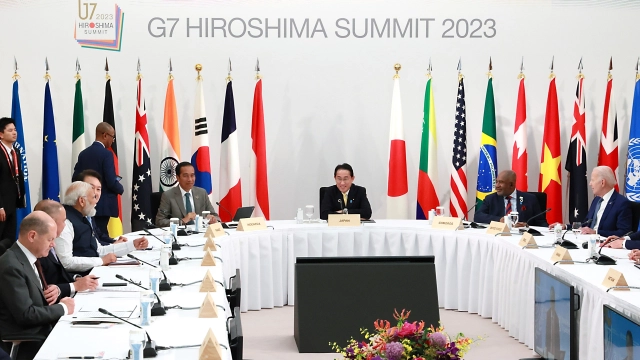
The G-7 summit, an association of seven developed nations, came to a close on Sunday in Hiroshima, Japan. Volodymyr Zelensky, the president of Ukraine, was invited to the conference this year. Through this, Russia has been given a very clear message. The summit also covered China, another adversary of the West.
United States, United Kingdom, Canada, France, Italy, Germany, and Japan make up the G-7. At the conference, Rishi Sunak, the prime minister of the UK, discussed the China problem. Beijing was highlighted by him as the current period’s greatest security and development issue. Claiming that authoritarianism is spreading throughout the nation.
The G-7 nations also denounced China in two declarations. On the concerns of Taiwan and the Indo-Pacific, they have clarified their stance. However, the most crucial message from the nations was on “economic harassment.” But it is not made clear who is engaging in economic harassment. But it is obvious that China is the target of the message.
The G-7 is making a calculated move with this message. These alliance nations’ economy have grown incredibly reliant on China. They are facing more competition from Beijing at the same time. China and other nations dispute on a number of human rights-related topics as well. The G7 believes they are now being kept captive.
This worry stems from the fact that China hasn’t held back in recent years when it comes to imposing penalties on nations it doesn’t like. Let’s discuss the G-7 and South Korea, a friend of the West. Following the installation of US air defense systems, China imposed sanctions on the nation. Australia was also barred as a result of the acrimony in the relationship.
Aside from that, China became irate because Lithuania, a Baltic nation, was allowed to host Taiwan’s embassy. Exports from the nation were prohibited. The European Union is now concerned about China’s action. Therefore, it comes as no surprise that the G-7 would oppose the growing trend to “kill economic vulnerability.”
The G-7 claims that “economic harassment” is being used to undercut the alliance’s and its partners’ positions in the globe as well as their domestic and international policies. In order to deal with the crisis, the G-7 is attempting to implement a “de-risking” strategy. As a result, the alliance and its allies will carry on with their diplomatic discussions, broaden their economic contacts, and ensure their own trade and technological advancements.
In addition, the G-7 leaders urged the creation of a “platform” to address “economic harassment” and cooperate with developing countries. It’s unclear how this phase will operate. However, it is anticipated that under the cover of this platform, the nations would cooperate by boosting commerce. Additionally, it will unite in opposition to the sanctions imposed by China.
The G-7 also intends to improve the flow of vital commodities like semiconductors and a variety of minerals through their supply chains. To stop hacking and the theft of technical data, the strategy also calls for upgrading digital infrastructure. The main goal is to prevent the opponent from gaining access to the technology employed in the intelligence and military sectors.
But the US has already taken this action. Chip and A-related technology exports to China are prohibited in the nation. The Netherlands and Japan have also joined this list. This time, the G-7 wants to be clear that despite China’s concerns, the ban would be gradually tightened.
At the conference, the G-7 leaders also made another point. In order to prevent technical data from being lost during study. Allegations of espionage to smuggle technological knowledge have previously alarmed a number of nations, notably the United States. Additionally, several individuals who stole technological data for China have received sentences.
China was not specifically mentioned by the G-7 in its declaration on economic retaliation. The alliance seemed to be quite diplomatic while discussing China at the summit. According to the alliance, their measures are not intended to hurt China or obstruct its development economically. Ao added that China obeying international law would be in everyone’s best interests.
It’s not entirely clear how Chinese diplomats and political figures would interpret this G-7 message. However, similar Western themes have already been attacked by Chinese official media. They noted that while the West decried China, it simultaneously profited from continuing trade ties with the nation.
Beijing condemned the G-7 declaration once more. They had previously predicted that the alliance would make a remark along such lines. And even before the G-7 began discussing “economic harassment,” China had leveled the same charge against the US. Beijing claimed that the G7 was “attacking” China on Saturday. Additionally, they protested Japan, the conference’s host country. The success of the G7 plan to deal with China is not yet certain. The people who asked for measures to stop China from “nozzling” on numerous matters, however, will undoubtedly be pleased. Andrew Small is one such authority on China and the Indo-Pacific. He believes that the G-7 proposal has a “touch of a real consensus.”
Hello there, just became alert to your blog through Google, and found
that it is really informative. I’m going to watch out for brussels.
I will be grateful if you continue this in future. A lot of
people will be benefited from your writing.
Cheers! Najlepsze escape roomy